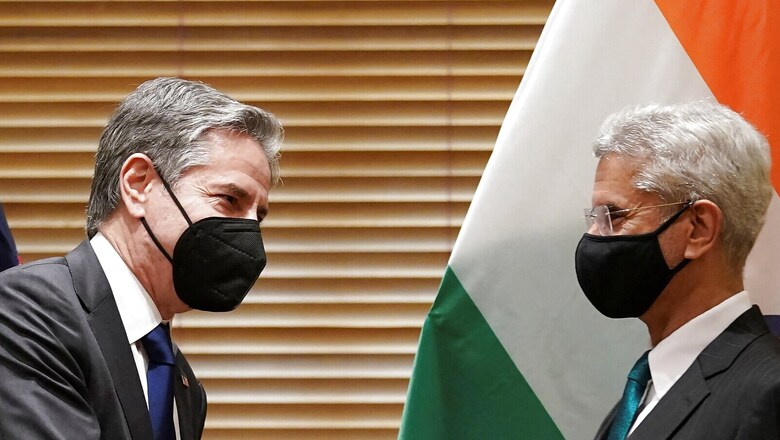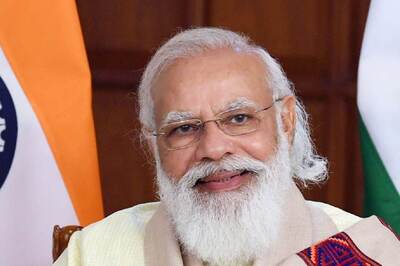
views
The fourth India-US 2+2 dialogue on April 11 is taking place under the shadow of the Ukraine conflict. The timing is not the most opportune for several reasons. One, US attention is now heavily focused on this conflict. It has consolidated US-Europe unity, boosting the sense of a revived US global leadership. It sees a chance to weaken Russia strategically, politically, economically and even militarily, with the prospect of a regime change in Russia appearing possible. The 2+2 meeting with India will have this as the backdrop.
Two, India has no interest in participating in this US ambition as, from India’s point of view, a strong Russia is in India’s larger geopolitical interest, apart from the importance of our bilateral relationship. There is some understanding at the official level about some aspects of our bilateral ties with Russia, especially the defence dependence, but even here the US, even before the Ukraine crisis, has been pressing for reduction of this dependence. US officials visiting India in recent weeks have been vocal on this, even suggesting that they can help in this process by procuring for us Soviet-era arms from Central and Eastern Europe and, indeed, establishing production facilities in Ukraine to provide what we need.
There is no talk of actively participating in our Atmanirbhar programme in defence manufacturing as a more effective means to reduce external dependence, be it from Russia or elsewhere. No mention has been made of the DTTI (Defence Technology and Trade Initiative) as a means to achieve this US goal. Reducing dependence on Russia and substituting it with dependence on the US is not a solution for India. It will be interesting to see what the 2+2 talks say about this.
Three, the CAATSA challenge remains. The 2+2 dialogue is the appropriate place to address this, but the signals from the US are not reassuring in this regard. Under Secretary of State Victoria Nuland, during her recent visit to India, left the issue in the air by stating that lifting CAATSA was a process and implied that the US was in talks with India and how the process ended would ultimately decide the issue. The past statements of both the US Secretary of State and the Defence Secretary have left the issue open. It is most unlikely that with dissatisfaction with India over our stand on Russia’s intervention in Ukraine, pressure on us over CAATSA will be released at this juncture.
Four, on a broader level, India is coming under criticism for not siding with the West on the Ukraine conflict, be it in the Congress, the media or among the US foreign policy experts. India is seen as still nourishing its nonaligned proclivities. Our repeated abstentions in the UN have come under fire. Moral arguments are being used to press India as a democracy to condemn Russia’s invasion of Ukraine. The issue is being framed as one between democracies and autocracies.
This argument has never held much appeal for India, with examples in mind of military interventions by the West in developing countries to impose democracy or the support given to non-democratic governments based on national interest. India has not historically, or even now, received support for its sovereignty as a democracy. Worse, discourse at diplomatic level apart, our democracy is liberally questioned by officially-linked NGOs and the western press in general. The democracy argument as a driver of our policy on Ukraine, however objectionable be the present situation there, is just posturing from our point of view. We will see how the 2+2 joint statement addresses this challenge.
ALSO READ | Demonising India over Ukraine Won’t Help, West Needs Delhi by its Side in Indo-Pacific Contest
Five, the issue of India abiding by US sanctions has been raised rather aggressively. Sanctions on Russia exceed anything seen before. While Cuba, Iraq, North Korea, Iran or Venezuela have been subject to sanctions, their participation in global affairs does not at all compare with that of Russia, which is a nuclear power and a permanent member of the UN Security Council. Russia cannot be isolated beyond a certain point, which India has to take into account in looking at the future of its ties with Moscow.
The US has no doubt imposed sanctions on Russian oil (though it seems it still obtains 8 per cent of its oil from Russia). Europe has not imposed such a ban, with a carve out from sanctions made out for Germany especially in view of its high dependence on Russia gas. Yet, India is being invidiously called upon by the US not to buy discounted Russian oil, even when the steep rise in oil prices is badly hurting our economy and the size of our imports of Russian oil is miniscule — less than 1 per cent of our total requirements. An increase in price of oil by only $1 adds half a billion $ to our import bill. Our Finance Minister is right in declaring that India will, in its national interest, buy oil at cheaper prices from whatever be the source.
The 2+2 dialogue is taking place in the backdrop of the US Deputy National Security Adviser while in New Delhi cautioning in general terms of consequences for countries if US sanctions are breached, especially if the rupee-ruble mechanism is used to bypass US sanctions. The White House spokesperson has endorsed the Deputy NSA’s message and White House member of the Economic Affairs Council has sharpened it further. This raises the question why on a sensitive relationship such as with India so many in the White House are making pronouncements. Is it lack of discipline or a concerted effort to administer warnings to India?
The absurdity of this is that the real breach of sanctions will occur because of strategic, political and economic ties between Russia and China, and China’s larger imperatives to side with Russia against the US. India’s oil trade will remain small – a week-plus amount of supplies if the off-take of Russian oil is doubled from that of last year. India’s total trade with Russia at less that $10 billion does not create much scope either for sanctions busting with a rupee-ruble mechanism. More so as India cannot pay Russia in $ or Euros because of US/EU sanctions. The suggestion by White House spokesperson that the US can help India even dispense with its 1 per cent oil supplies from Russia is adding insult to injury. India is actually buying 8 per cent of its oil from the US. Will the US offer a steep discount?
Six, the 2+2 dialogue will no doubt focus on the Indo-Pacific and the Quad, if only to re-assure that the conflict with Russia will not mean America’s focus shifting away from Asia and China. The reality is that the Ukraine issue is likely to be long drawn; the relationship with Russia is now beyond repair so long as Putin is in power. Even a revitalised Nato alliance cannot simultaneously deal with the Russia and China challenges. Europe will pay an economic price for the sanctions that the West has imposed on Russia. Economic ties with China are much more expansive and sanctioning it will recoil severely on the West.
Does this imply that the US will for the time being be more careful in dealing with China, despite announcements about boosting the missile capability of Australia? The read-out of the Biden-Xi virtual meeting from the Chinese side suggests an effort by Biden to reassure China that no US alliance in the region is directed at China. The threat of sanctions against China, as in the White House read-out, is contradicted by the decision by the Biden administration to remove 64 per cent of the increased tariffs imposed by Trump on Chinese products.
The previous 2+2 dialogues had seen progress in India signing the foundational agreements, more elaborate military exercises and so on. It is to be seen what concrete progress this round of the dialogue will produce. Russia will no doubt follow the outcome of this dialogue with close interest.
India has to draw its own conclusions from the long-term disruptions being caused to the global political and economic order by the unprecedented scope of the West’s sanctions on Russia, including arbitrary confiscation of state and individual assets, personal sanctions against state leaders, ouster from international organisations, the weaponising of finance etc. The implications go far beyond Russia to all those belonging to the global South. The 2+2 dialogue will be an exercise in confidence building between India and the US in view of the issues raised by the Ukraine crisis.
Kanwal Sibal is the former Indian Foreign Secretary. He was India’s Ambassador to Turkey, Egypt, France and Russia. The views expressed in this article are those of the author and do not represent the stand of this publication.
Read all the Latest Opinion News and Breaking News here



















Comments
0 comment